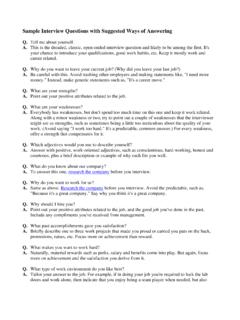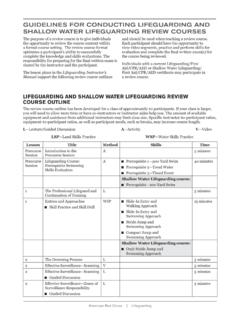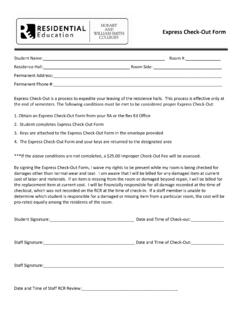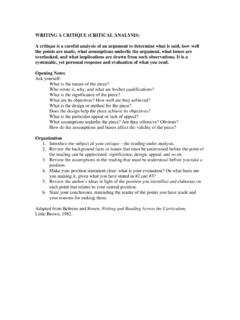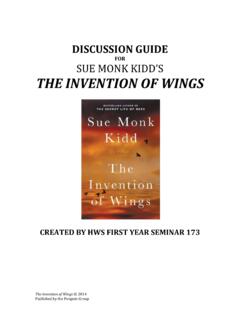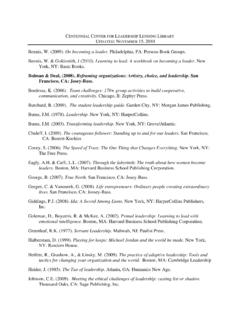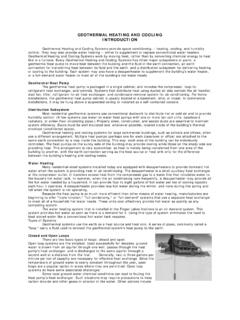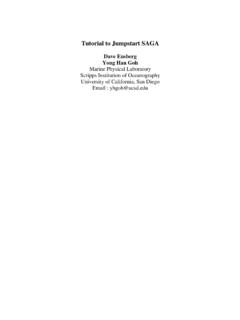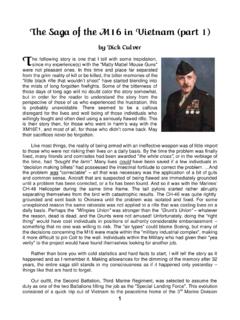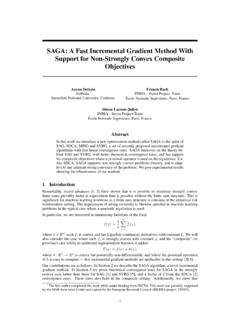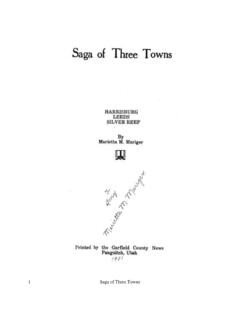Transcription of The Legendary Saga of the Volsungs Cecelia Lefurgy
1 1 The Legendary saga of the Volsungs Cecelia Lefurgy Viking Art and Literature October 4, 2007 Professor Tinkler and Professor Erussard Stories that are passed down through oral and written traditions are created by societies to give meaning to, and reinforce the beliefs, rules and habits of a particular culture. For Germanic culture, The saga of the Volsungs reflected the societal traditions of the people, as well as their attention to mythology. In the saga , Sigurd of the Volsung 2bloodline becomes a respected and heroic figure through the trials and adventures of his life. While many of his encounters are fantastic, they are also deeply rooted in the values and belief structures of the Germanic people.
2 Tacitus, a Roman, gives his account of the actions and traditions of early Germanic peoples in Germania. His narration remarks upon the importance of the blood line, the roles of women and also the ways in which Germans viewed death. In Snorri Sturluson s The Prose Edda, a compilation of Norse mythology, Snorri Sturluson touches on these subjects and includes the perception of fate, as well as the role of shape changing. Each of these themes presented in Germania and The Prose Edda aid in the formation of the Legendary saga , The saga of the Volsungs . Lineage is a meaningful part of the Germanic culture.
3 It provides a sense of identity, as it is believed that qualities and characteristics are passed down through generations. In the Volsung bloodline, each member is capable of, and expected to achieve greatness. As Sigmund, Sigurd s father, lay wounded on the battlefield, his wife asked if she should attend to his injuries so that he may avenge her father. He replied to her, That is intended for another. You are carrying a son. Raise him well and carefully, for he will be an excellent boy, the foremost of our line (The saga of the Volsungs 54). Even before his birth, Sigurd s greatness was predicted because the strength and courage of his lineage would be passed down through his father.
4 Regin, a man that acted as Sigurd s foster father, was part of a family associated with sordid deeds. Regin often questioned Sigurd s adherence to the qualities of his previous family members. He first accuses him of being too much like a servant, saying that it is strange that you want to be the stable boy of kings or to go about like a 3vagrant (The saga of the Volsungs 56). Next, Regin claims that he is unlike his fathers because he is without gold, you have too little wealth. It vexes me that you run around like a messenger boy (The saga of the Volsungs 56). Most severe, Regin attacks Sigurd s character directly by saying, although you are of the Volsung stock, you do not appear to have the spirit of that kin, which is figured the foremost in every form of distinction (The saga of the Volsungs 57).
5 It is an insult to Sigurd to be accused of not living up to the expectations of his family line. Sigurd finally asks Regin why he continues to expect so much from a boy just out of childhood. Regin responds by telling him the story of his own lineage, in which his brother, Otr, is killed by three of the gods, Odin, Loki and Hoenir. To compensate Regin s family, they present them with gold stolen from the Dwarf, Andvari. Regin s other brother, Fafnir, kills their father, hides the body (a very serious crime), and guards the treasure. Regin is eager for Sigurd to become a great and courageous fighter, because he wants him to kill Fafnir and regain the treasure.
6 Only after slaying Fafnir, does Sigurd realize that Regin is as equally treacherous as his brethren. Sigurd tastes the blood of Fafnir, and suddenly could understand the speech of birds (The saga of the Volsungs 66). The birds reveal that Regin is going to betray Sigurd, and that he would be wise to kill him and keep Fafnir s heart for himself. Tacitus notes that there is very little integration of foreign people into the Germanic culture. He wrote, As to the Germans themselves, I think it probable that they are indigenous and that very little foreign blood has been introduced by either invasions or by friendly dealings with neighboring peoples (Tacitus 101).
7 This could be part of the reason why the bloodline is so important to the culture, as well as to the characters in the 4story. With little outside interference, it is possible to trace and recall family members. The bonds between family members are so strong, that when alliances between families are formed, they are reinforced through marriage, and by the birth of children. The strength of the alliance is compared to direct kinship. In the saga of the Volsungs , they swore a pact of brotherhood, as if they were brothers born of the same parents (The saga of the Volsungs 79). Lineage is equally meaningful, because it is the determining factor in choosing leaders.
8 Tacitus writes that, They [the Germanic people] choose their kings for their noble birth (Tacitus 107). The bloodline is meaningful to the Vikings because it has an influence over the way that their society is conducted. One curiosity regarding the bloodline is the seamless integration of animals and monsters into the family tree. In Regin s tale of Otr s Ransom, his brother Otr is in fact, an otter. In his story, he says that his brother had the likeness of an otter during the day and was always in the river bringing up fish in his mouth (The saga of the Volsungs 57). Fafnir takes on the shape of a serpent when he protects the treasure of the dwarves.
9 Regin and his father, however, are presumed to be human. This family parallels the strange offspring of Loki in The Prose Edda: Loki had three children. One was the Fenriswolf, the second was the Midgard Serpent and the third was Hel (Sturluson 39). The gods knew that the children would become powerful and bring about misfortune. They threw the Midgard Serpent into the sea, Hel into Niflheim to rule over the underworld, and bound Fenriswolf in a fetter. Both families encounter misfortune, although Loki s children are able to exact revenge before their deaths. Animal children are not the only connection between man and beast.
10 Some characters in the Volsung saga possess the ability to change their shape into that of 5another person or an animal. Andvari the dwarf was caught by Loki, who stole his gold to pay atonement to Regin s family: He was in the shape of a pike and caught food there for himself, for there were many fish in the falls (The saga of the Volsungs 58). As well as the dwarf, Loki himself has the ability to change shapes. He often uses this power to his advantage when he is performing evil deeds. In The Prose Edda, Frigg, the wife of Odin, protects her son Baldr by casting a spell that will keep all of the elements of nature from injuring him.
